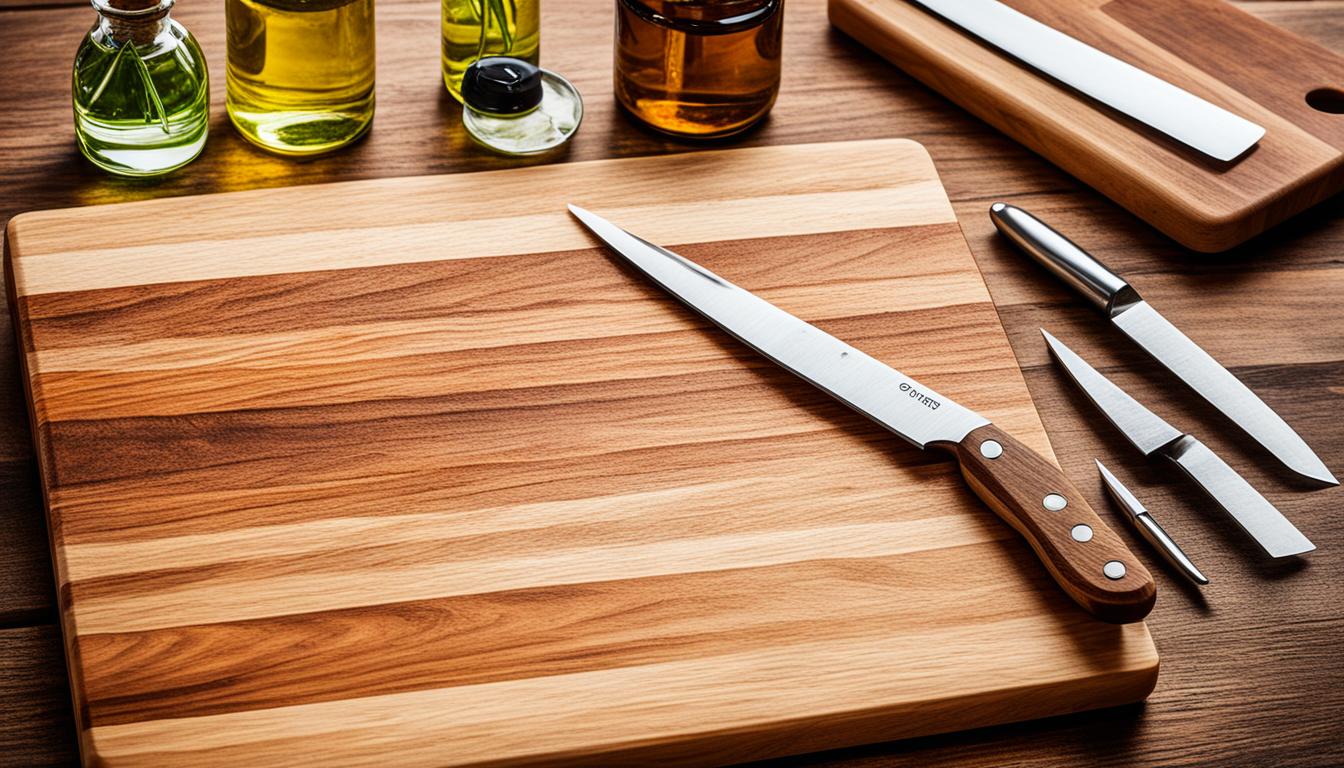When it comes to maintaining our beloved cutting boards and knives, we often find ourselves searching for the perfect solution. But have you ever considered using mineral oil? This versatile substance, also known as liquid paraffin, has gained a reputation for being the go-to product for preserving wooden kitchen items. But is mineral oil truly the answer to all our cutting board and knife maintenance needs? Let’s dig deeper and uncover the truth.
Contrary to common belief, mineral oil is not only ideal but also highly recommended for the care and longevity of cutting boards and knives. Its non-toxic and non-drying nature makes it a safe choice for food preparation areas. By preventing water absorption, mineral oil helps prevent warping, cracking, and bacterial growth on wooden surfaces. But that’s not all. Regularly applying mineral oil can significantly extend the lifespan of your favorite kitchen tools.
However, mineral oil is just the beginning. In this article, we will explore the benefits of using mineral oil for cutting boards and knives, as well as other alternatives for cutting board maintenance. We will also share some best practices to keep your cutting boards in top shape. So, join us on this journey as we unlock the secrets to maintaining and preserving your precious cutting boards and knives.
The Benefits of Mineral Oil for Cutting Boards and Knives
Mineral oil offers several benefits when it comes to maintaining and preserving cutting boards and knives. One of the key advantages of using mineral oil is its ability to prevent water absorption in cutting boards. By creating a protective barrier, mineral oil helps to ward off the negative effects of moisture, such as warping, cracking, and bacterial growth.
Another significant benefit of mineral oil is its non-toxic nature. It is odorless, tasteless, and safe to use in food preparation areas. This makes it an ideal choice for ensuring the cleanliness and safety of your kitchen tools. To further guarantee the safety of your cutting boards, it is essential to choose a food-grade mineral oil specifically designed for this purpose.
Regular application of mineral oil is crucial for preserving the life of your cutting boards and knives. By moisturizing the wood, mineral oil helps to prevent dryness and brittleness. It is recommended to apply mineral oil to the cutting board regularly, ensuring that all surfaces, including the sides, are adequately coated. This will help to maintain the integrity of the wood and extend the lifespan of your cutting board.
To illustrate the importance of mineral oil in cutting board maintenance, consider the image below:
Other Alternatives for Cutting Board Maintenance
While mineral oil is a popular choice for cutting board maintenance, there are other alternatives available. These alternatives offer different benefits and can be used to keep your wooden kitchen items in excellent condition.
1. Beeswax: Beeswax is a natural wax that can be used to hydrate, shine, and waterproof cutting boards. It creates a protective layer on the surface, preventing moisture from seeping into the wood. You can either purchase ready-made beeswax products or make your own by melting beeswax and combining it with mineral oil. This combination provides added protection and helps maintain the natural beauty of your cutting board.
2. Coconut oil: Refined coconut oil is another great option for treating cutting boards. It is rich in saturated fats that help moisturize the wood and prevent drying. Coconut oil also has natural antibacterial properties, making it a safe choice for maintaining kitchen hygiene. Simply apply a thin layer of coconut oil to the surface of the cutting board and let it absorb overnight. Wipe off any excess oil the next day to maintain a smooth finish.
3. Carnauba wax: Derived from palm leaves, carnauba wax offers a glossy finish and excellent water resistance for wooden kitchen items. It forms a protective barrier that helps prevent water absorption and staining. You can apply carnauba wax to your cutting board using a soft cloth or brush. Ensure that the wax is evenly distributed and allow it to cure for at least 15 minutes before wiping off any excess.
4. Baking soda and lemon juice: For removing tough stains and odors from cutting boards, a simple mixture of baking soda and lemon juice can work wonders. Sprinkle baking soda on the surface of the cutting board, then rub it gently with a sliced lemon. The natural acidity of the lemon juice combined with the cleaning properties of baking soda will help break down stains and eliminate odors.
These alternatives to mineral oil offer different benefits and can be used in combination with one another or as standalone options. Experiment to find the solution that works best for you and your wooden kitchen items. Remember to always follow the manufacturer’s recommendations and properly clean and maintain your cutting board to ensure its longevity.
Best Practices for Cutting Board Care
To effectively maintain our cutting boards and preserve our knives, it is essential to follow a few best practices. Firstly, regular application of a food-grade mineral oil or a combination of oils and waxes is crucial to prevent drying and cracking. Ensuring an even application of the oil on all surfaces of the board, including the sides, will help maintain its integrity.
Proper cleaning of the cutting board after each use is equally important. Using hot soapy water or a diluted bleach solution to disinfect the board, especially after cutting raw meat or poultry, helps prevent bacterial growth. We should avoid using vegetable oils, varnish, or rubbing alcohol, as they can be harmful to the board and affect the taste of our food.
When it comes to removing stains, baking soda proves to be a handy solution. And to eliminate odors, rubbing the surface with a lemon can do the trick. By incorporating these best practices into our cutting board care routine, we can ensure the longevity and cleanliness of our cutting boards and knives, promoting a safe and hygienic cooking experience.
